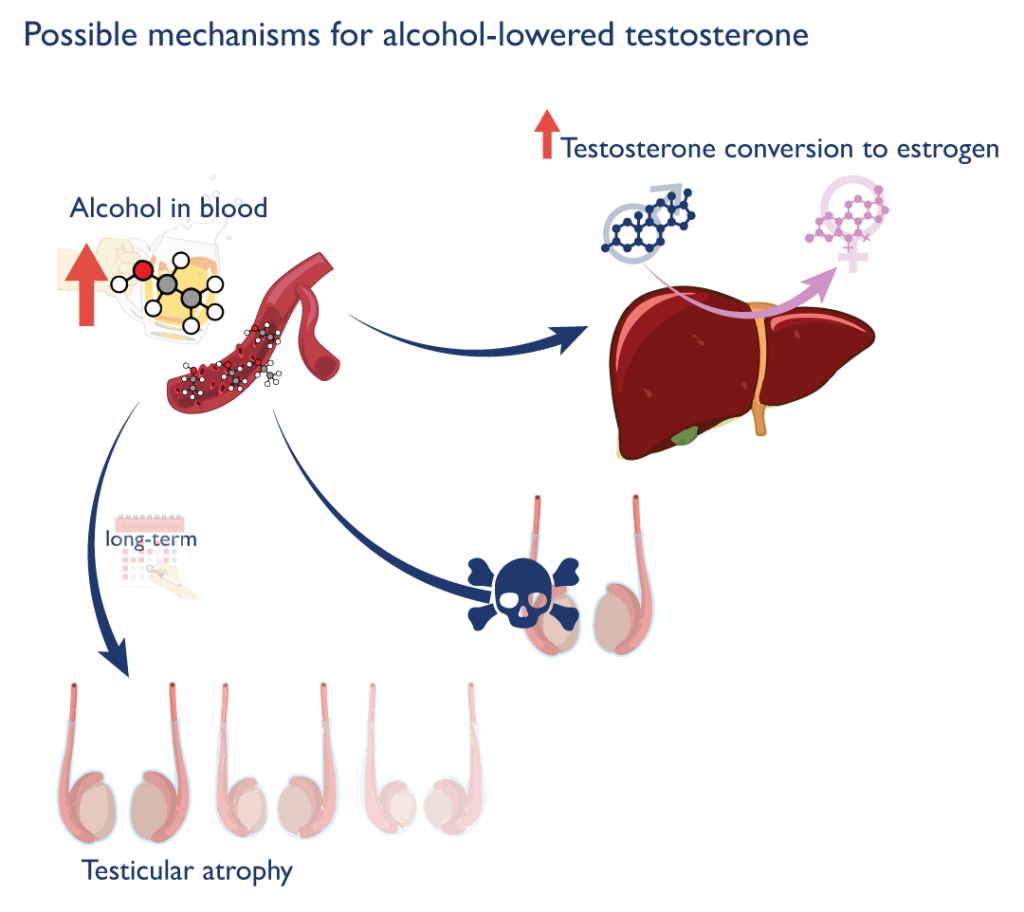Introduction
 Alcohol abuse is a serious health problem in the United States. The Centers for Disease Control and Prevention (CDC) estimates that nearly 15% of adults suffer from an alcohol use disorder, including binge drinking or heavy drinking. Alcohol consumption can be harmful to your overall health and may lead to serious complications such as liver disease and cancer. However, what many people don’t realize is that alcohol can also affect your fertility and sexual potency among men. This article reviews the effects of alcohol abuse on male fertility and sexual potency based on a review of multiple studies conducted over the past several years
Alcohol abuse is a serious health problem in the United States. The Centers for Disease Control and Prevention (CDC) estimates that nearly 15% of adults suffer from an alcohol use disorder, including binge drinking or heavy drinking. Alcohol consumption can be harmful to your overall health and may lead to serious complications such as liver disease and cancer. However, what many people don’t realize is that alcohol can also affect your fertility and sexual potency among men. This article reviews the effects of alcohol abuse on male fertility and sexual potency based on a review of multiple studies conducted over the past several years
Alcohol abuse is a serious health problem in the United States.
Alcohol abuse is a serious health problem in the United States. Alcohol abuse is defined as the regular use of alcohol that results in adverse social, medical and/or legal consequences. The National Institute on Alcohol Abuse and Alcoholism estimates that 18.1 million people in the United States have an alcohol use disorder, or AUD, which includes alcohol dependence (also called alcoholism) and alcohol abuse.
The effects of alcohol on fertility and sexual potency among men vary with different individuals.
The effects of alcohol on the male reproductive system and fertility vary between individuals. The following are some general rules that might explain why a man’s sperm count and sexual potency is affected by drinking.
- Alcohol affects the production of sex hormones in men as well as their sperm count, which causes changes in their reproductive organs and genitals.
- Alcohol abuse can affect fertility in males because it also affects how the body releases testosterone (a male hormone) into the bloodstream.
- A man’s level of tolerance for alcohol also varies, so it depends on how much he has been drinking over time before going to bed with his partner if he will still be able to perform sexually or not after having too much to drink prior to having sex with his wife/girlfriend/partner/significant other.

Men who consume excessive amounts of alcohol are infertile due to its effect on male reproductive organs and the release of sex hormones
The male reproductive organs are adversely affected by alcohol. The testicles produce sperm cells and sex hormones such as testosterone and androgen. Alcohol may affect the production of sperm and quality of ejaculate.
The spermatogenesis phase is interrupted by excessive drinking, resulting in reduced fertility or sterility (1). Cues from external environment can be detected through sense organs like eyes, ears, nose etc., which relay information to brain about food availability in the neighborhood or changes in weather conditions etc. This information is processed by a region called hypothalamus (2).
When an organism experiences hunger due to lack of food intake at regular intervals during long periods, it sends signals via endocrine system to pituitary gland (3), which releases hormones that act on various parts such as liver & pancreas etc., so they secrete glucose into blood stream as soon as possible even when adequate amount wasn’t available before hand
Moderate consumption of alcohol does not affect fertility or semen quality in most men, but chronic consumption may contribute to infertility.
Moderate consumption of alcohol does not affect fertility or semen quality in most men, but chronic consumption may contribute to infertility. Alcohol abuse is a serious health problem in the United States, and it can cause infertility and other health problems. Alcohol abuse can damage sperm and make it difficult to get pregnant.
The effects of alcohol on male fertility are complex. In general, moderate consumption of alcohol does not affect fertility or semen quality in most men; however, chronic consumption may contribute to infertility.
Male infertility can be caused by low sperm production, abnormal sperm function or obstructions that prevent the delivery of sperm.
Male infertility can be caused by low sperm production, abnormal sperm function or obstructions that prevent the delivery of sperm.
According to the American Society for Reproductive Medicine (ASRM), male infertility affects about 15 to 20 percent of couples trying to conceive. Alcohol abuse can cause male infertility in a variety of ways:
- Low sperm production: Alcohol use causes hormone changes that lead to a decreased amount of testosterone, which is necessary for healthy male reproductive function.
- Abnormal sperm function: Heavy alcohol use can cause damage and dysfunction in developing sperm cells in the testicles. This can result in abnormal semen parameters such as decreased motility (how much sperms move) and viability (how many sperms survive).
Alcohol abuse can harm your body and make you infertile.
- Alcohol abuse can damage your body and make you infertile.
- It can affect the brain, heart and blood vessels.
- It can affect the reproductive organs of men and women.
- Alcohol causes weight gain which in turn affects fertility in both sexes.
- Depression is also a major factor which affects the quality of sperm in men as well as ovulation cycles in women.
Conclusion
If you are an alcoholic and want to have a child, there are many resources available to help you. Alcohol abuse is a serious health problem in the United States. If you or someone you know needs assistance with alcohol abuse, please call 1-800-AA-YOUTH or visit their website at www.aa.org for more information on treatment centers and support groups near your location.
